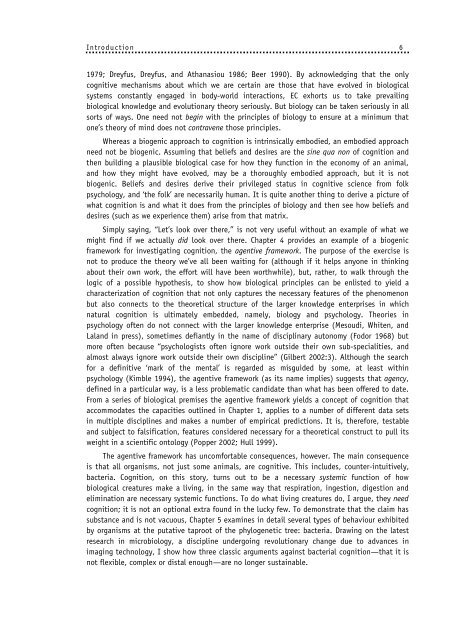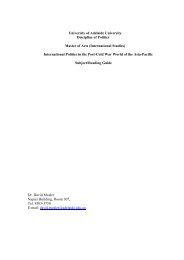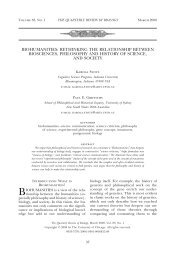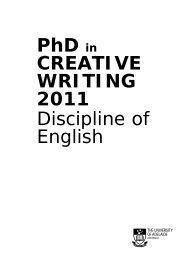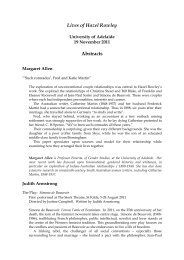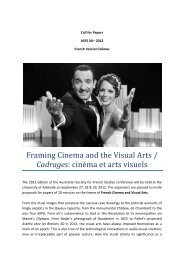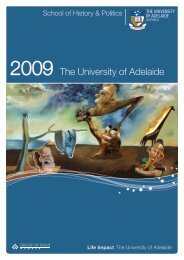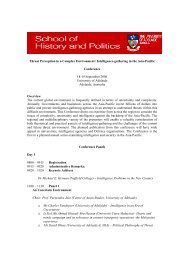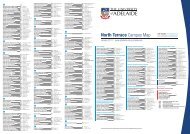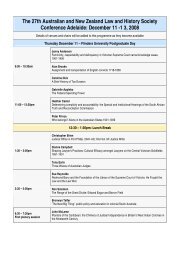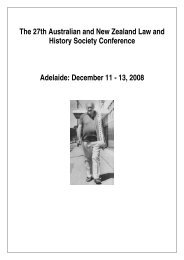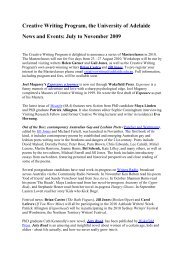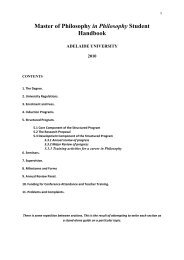Introduction - Faculty of Humanities & Social Sciences
Introduction - Faculty of Humanities & Social Sciences
Introduction - Faculty of Humanities & Social Sciences
You also want an ePaper? Increase the reach of your titles
YUMPU automatically turns print PDFs into web optimized ePapers that Google loves.
Introdu ctio n 6<br />
1979; Dreyfus, Dreyfus, and Athanasiou 1986; Beer 1990). By acknowledging that the only<br />
cognitive mechanisms about which we are certain are those that have evolved in biological<br />
systems constantly engaged in body-world interactions, EC exhorts us to take prevailing<br />
biological knowledge and evolutionary theory seriously. But biology can be taken seriously in all<br />
sorts <strong>of</strong> ways. One need not begin with the principles <strong>of</strong> biology to ensure at a minimum that<br />
one’s theory <strong>of</strong> mind does not contravene those principles.<br />
Whereas a biogenic approach to cognition is intrinsically embodied, an embodied approach<br />
need not be biogenic. Assuming that beliefs and desires are the sine qua non <strong>of</strong> cognition and<br />
then building a plausible biological case for how they function in the economy <strong>of</strong> an animal,<br />
and how they might have evolved, may be a thoroughly embodied approach, but it is not<br />
biogenic. Beliefs and desires derive their privileged status in cognitive science from folk<br />
psychology, and ‘the folk’ are necessarily human. It is quite another thing to derive a picture <strong>of</strong><br />
what cognition is and what it does from the principles <strong>of</strong> biology and then see how beliefs and<br />
desires (such as we experience them) arise from that matrix.<br />
Simply saying, “Let’s look over there,” is not very useful without an example <strong>of</strong> what we<br />
might find if we actually did look over there. Chapter 4 provides an example <strong>of</strong> a biogenic<br />
framework for investigating cognition, the agentive framework. The purpose <strong>of</strong> the exercise is<br />
not to produce the theory we’ve all been waiting for (although if it helps anyone in thinking<br />
about their own work, the effort will have been worthwhile), but, rather, to walk through the<br />
logic <strong>of</strong> a possible hypothesis, to show how biological principles can be enlisted to yield a<br />
characterization <strong>of</strong> cognition that not only captures the necessary features <strong>of</strong> the phenomenon<br />
but also connects to the theoretical structure <strong>of</strong> the larger knowledge enterprises in which<br />
natural cognition is ultimately embedded, namely, biology and psychology. Theories in<br />
psychology <strong>of</strong>ten do not connect with the larger knowledge enterprise (Mesoudi, Whiten, and<br />
Laland in press), sometimes defiantly in the name <strong>of</strong> disciplinary autonomy (Fodor 1968) but<br />
more <strong>of</strong>ten because “psychologists <strong>of</strong>ten ignore work outside their own sub-specialities, and<br />
almost always ignore work outside their own discipline” (Gilbert 2002:3). Although the search<br />
for a definitive ‘mark <strong>of</strong> the mental’ is regarded as misguided by some, at least within<br />
psychology (Kimble 1994), the agentive framework (as its name implies) suggests that agency,<br />
defined in a particular way, is a less problematic candidate than what has been <strong>of</strong>fered to date.<br />
From a series <strong>of</strong> biological premises the agentive framework yields a concept <strong>of</strong> cognition that<br />
accommodates the capacities outlined in Chapter 1, applies to a number <strong>of</strong> different data sets<br />
in multiple disciplines and makes a number <strong>of</strong> empirical predictions. It is, therefore, testable<br />
and subject to falsification, features considered necessary for a theoretical construct to pull its<br />
weight in a scientific ontology (Popper 2002; Hull 1999).<br />
The agentive framework has uncomfortable consequences, however. The main consequence<br />
is that all organisms, not just some animals, are cognitive. This includes, counter-intuitively,<br />
bacteria. Cognition, on this story, turns out to be a necessary systemic function <strong>of</strong> how<br />
biological creatures make a living, in the same way that respiration, ingestion, digestion and<br />
elimination are necessary systemic functions. To do what living creatures do, I argue, they need<br />
cognition; it is not an optional extra found in the lucky few. To demonstrate that the claim has<br />
substance and is not vacuous, Chapter 5 examines in detail several types <strong>of</strong> behaviour exhibited<br />
by organisms at the putative taproot <strong>of</strong> the phylogenetic tree: bacteria. Drawing on the latest<br />
research in microbiology, a discipline undergoing revolutionary change due to advances in<br />
imaging technology, I show how three classic arguments against bacterial cognition—that it is<br />
not flexible, complex or distal enough—are no longer sustainable.


